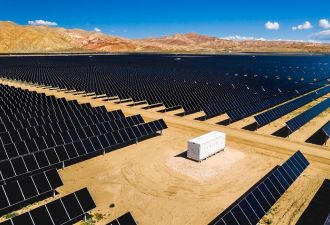The solar industry has risen in popularity, in part as a result of its good intentions -- but soon it will have to start to play ugly.
Public opinion data from Tigercomm provide numbers for what many of you already suspect. Solar enjoys overwhelming approval from the public, who see it as a way to wean ourselves off fossil fuels and stimulate local economies.
Eighty percent of Americans rated solar power favorably, compared to 39 percent for nuclear and 32 percent for oil. 74 percent believe that solar is a “long-term solution for the country’s energy needs.” (Tigercomm and Gotham Research Group will go over the numbers at a lunch at The Palm restaurant at 1100 S. Flower street as part of SPI today at 12:30.) Twenty-nine states and the District of Columbia have renewable portfolio standards.
The SEIA, meanwhile, says that 94 percent of Americans see solar as important and 80 percent want to see subsidies transferred from fossil fuel to solar.
Unfortunately, the public also said solar is too expensive, will remain an intermittent source of power, and can’t really directly compete with coal or natural gas. Only 41 percent thought solar was affordable, and only 34 percent thought it was reliable.
Seventeen percent said solar would “never” be the largest source of new electricity for whole cities. Most of those polled were largely in the dark about the subsidies provided to oil and gas. Just 19 percent correctly estimated that the fossil fuel industry gets more than $10 billion in subsidies.
And chances are it will get worse as fossil fuel providers pour on the money for ads and lobbyists to turn back the gains of the renewable industry. Valero, Tesero and Koch Industries have poured millions into the campaign for Prop 23 that could put California’s greenhouse gas regulations on hold for years. Natural gas has been flogging the airwaves with ads starring the Flonase woman informing us how wonderfully patriotic methane is.
The open question is whether the industry has the stomach to fight back -- which is where Karl Rove comes in. The industry needs to outline in clear, sound-bite-like blurbs how solar will become the affordable best option in the future. More importantly, the spokesman needs to dig up dirt on the fossil industry.
Things like:
--The federal government lets the richest oil companies take oil out of the Gulf of Mexico for free. And then the oil companies sell it to you for $3 a gallon.
--Solar and other renewable energy companies have created 500,000 new jobs in California since 2005 according to Governor Arnold Schwarzenegger. Most new jobs in fossil fuel have been at gas stations.
--BP may only pay one-tenth of the cost of the Gulf oil spill cleanup because of big-government rules designed to protect them.
--Solar plants built in California’s Mojave Desert over 20 years ago have had fewer down days that coal or gas plants. The last time these plants saw a dip in power production was when Mt. Pinatubo blew.
--Did you know the state of Kentucky pays $115 million to the richest coal companies in the world every year despite chronic unemployment among its residents?
--Recent studies indicate that nuclear power costs 3 to 4 times more than wind or solar power, and that’s not even counting in the cost of storage of nuclear waste. Nuclear plants also can take far longer to erect and create far fewer jobs.
--Solar employment grew by 37 percent in 2009 and will account for 60,000 jobs in 2010. Most of these jobs will come from small businesses.
--The federal government gives the coal industry more than $17 billion a year, including nearly $1 billion in tax breaks, to dig on federal lands. That’s your real estate.
--Solar, wind and other renewables accounted for more new power than coal or fossil fuel in 2009.
All of these statements are true. Exaggerated for effect, but true.
The solar industry has touted stats like this before, but just not with the same vigor and venom that is required. Or even the straightforward simplicity. You could put statements like this on (soy-based) plastic cards and give them to solar installers or voter organizations to pass out. You could whittle down a few into memorable catchphrases and run them in ads. This is exactly what Rove did. He was underhanded, loud, and relentless -- but effective. While I don’t agree politically with him, you have to admire the pudgy little cherub's resilience.
The renewable industry, and Democrats in general, though, often react to a challenge like this by becoming ineffectual and whiny. This self-defeating tendency really is one of the worst things about being on this side of the political ledger.
Think of it for a second. When the energy bill was going into its death spiral in Washington, some solar companies like SunRun were attacking the PACE program for home retrofitters. Why wage war against an ally for crumbs?
Here’s another example. Earlier this year, the International Energy Agency said that renewables got $45 billion worldwide in subsides in 2008 while the fossil industry got $557 billion. It’s a great stat, but good luck finding alarming data points behind those numbers. What's more, good luck finding someone outside the industry who knows it.
The solar industry doesn’t have as much money to lobby the government or buys as big coal does. True, but there are also likely spokespeople -- Arnold, Jay Leno -- who appeal to the mainstream and will serve as cut-rate activists. It’s not like Charlton Heston commanded a premium out of the NRA.
The renewable side of the debate also has a tendency to over-intellectualize. If you bring up fossil fuel subsidies, invariably someone will add, “And don’t forget the cost to protect tankers in the Persian Gulf.” It’s a valid point, but a confusing one, and one that requires people to discriminate between direct and indirect subsides. It can also alienate. The tankers in the Straits of Homuz aren’t there just for Exxon; Consumers want that fuel, too. Inevitably, some of the people you want to persuade feel singled out and blamed.
Be more 'meat and potatoes.' Get someone who served in Iraq to ask Americans to “Make energy here. Bring us home.” Secretary of the Navy Ray Mabus made a tremendous speech this year about why the Navy wants to boost its renewables to 50 percent and slash energy consumption on bases. He’s likely got quotes the industry can use.
Ultimately, if solar can dig out enough damaging stats, pare down its message, and then relentlessly stay on point like a crazed escapee from Scarborough Country, the industry has a chance to start winning over the valued bloc of voters who are fiscally conservative and socially progressive.
If this group starts to swing toward solar, the opposition will largely get reduced to 1) individuals who weirdly view environmentalism as a sign of moral decay and 2) conventional fuel companies. Seizing the middle ground is how Earth Day went from being a kooky fringe event to something Nixon embraced.
It will take time -- and a lot of shouting -- but this is a fight that's worth it.



